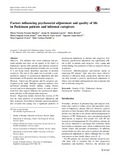Mostrar el registro sencillo del ítem
Factors influencing psychosocial adjustment and quality of life in Parkinson patients and informal caregivers
| dc.creator | Navarta Sánchez, María Victoria | es_ES |
| dc.creator | Senosiain García, J. M. | es_ES |
| dc.creator | Riverol Fernández, M. | es_ES |
| dc.creator | Ursúa Sesma, M. E. | es_ES |
| dc.creator | Anaut Bravo, Sagrario | es_ES |
| dc.date.accessioned | 2020-09-22T07:53:13Z | |
| dc.date.available | 2020-09-22T07:53:13Z | |
| dc.date.issued | 2016 | |
| dc.identifier.issn | 1573-2649 | |
| dc.identifier.uri | https://hdl.handle.net/2454/38163 | |
| dc.description.abstract | Objective: The influence that social conditions and personal attitudes may have on the quality of life (QoL) of Parkinson’s disease (PD) patients and informal caregivers does not receive enough attention in health care, as a result of it not being clearly identified, especially in informal caregivers. The aim of this study was to provide a comprehensive analysis of psychosocial adjustment and QoL determinants in PD patients and informal caregivers. Methods: Ninety-one PD patients and 83 caregivers participated in the study. Multiple regression analyses were performed including benefit finding, coping, disease severity and socio-demographic factors, in order to determine how these aspects influence the psychosocial adjustment and QoL in PD patients and caregivers. Results: Regression models showed that severity of PD was the main predictor of psychosocial adjustment and QoL in patients. Nevertheless, multiple regression analyses also revealed that coping was a significant predictor of psychosocial adjustment in patients and caregivers. Furthermore, psychosocial adjustment was significantly related to QoL in patients and caregivers. Also, coping and benefit finding were predictors of QoL in caregivers but not in patients. Conclusions: Multidisciplinary interventions aimed at improving PD patients’ QoL may have more effective outcomes if education about coping skills, and how these can help towards a positive psychosocial adjustment to illness, were included, and targeted not only at patients, but also at informal caregivers. | en |
| dc.description.sponsorship | This study was funded by PIUNA programme of the University of Navarre (Grant number 29028151). | en |
| dc.format.extent | 11 p. | |
| dc.format.mimetype | application/pdf | en |
| dc.language.iso | eng | en |
| dc.publisher | Springer | en |
| dc.relation.ispartof | Quality of Life Research, 2016, 25, 1959-1968 | en |
| dc.rights | © The Author(s) 2016. This article is distributed under the terms of the Creative Commons Attribution 4.0 International License, which permits unrestricted use, distribution, and reproduction in any medium, provided you give appropriate credit to the original author(s) and the source, provide a link to the Creative Commons license, and indicate if changes were made. | en |
| dc.rights.uri | http://creativecommons.org/licenses/by/4.0/ | |
| dc.subject | Quality of life | en |
| dc.subject | Parkinson's disease | en |
| dc.subject | Psychosocial variables | en |
| dc.subject | Caregivers | en |
| dc.title | Factors influencing psychosocial adjustment and quality of life in Parkinson patients and informal caregivers | en |
| dc.type | info:eu-repo/semantics/article | en |
| dc.type | Artículo / Artikulua | es |
| dc.contributor.department | Trabajo Social | es_ES |
| dc.contributor.department | Gizarte Lana | eu |
| dc.rights.accessRights | info:eu-repo/semantics/openAccess | en |
| dc.rights.accessRights | Acceso abierto / Sarbide irekia | es |
| dc.identifier.doi | 10.1007/s11136-015-1220-3 | |
| dc.relation.publisherversion | https://doi.org/10.1007/s11136-015-1220-3 | |
| dc.type.version | info:eu-repo/semantics/publishedVersion | en |
| dc.type.version | Versión publicada / Argitaratu den bertsioa | es |
Ficheros en el ítem
Este ítem aparece en la(s) siguiente(s) colección(ones)
La licencia del ítem se describe como © The Author(s) 2016. This article is distributed under the terms of the
Creative Commons Attribution 4.0 International License, which permits unrestricted use,
distribution, and reproduction in any medium, provided you give
appropriate credit to the original author(s) and the source, provide a
link to the Creative Commons license, and indicate if changes were
made.



